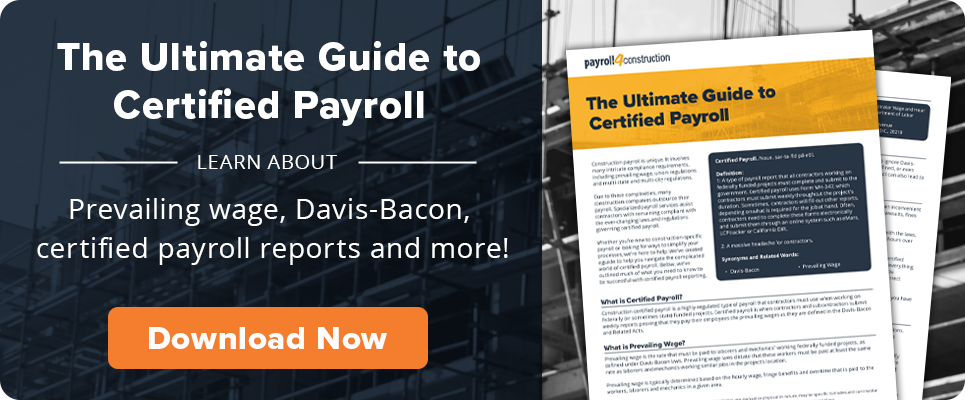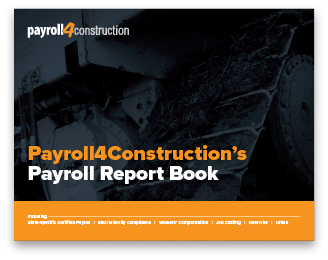
by Alex Gray
December 5, 2024
Managing the complexities of construction payroll is a crucial task for any construction business.
Construction payroll services provide various reports that help construction companies maintain compliance, track labor costs, and streamline administrative processes.
Let’s explore the different types of reports offered and discuss the data each provides and its usefulness for contractors.
Construction Payroll Reports Key Takeaways
- Compliance is Critical: Construction contractors working on federally-funded projects or public works projects must strictly adhere to Davis-Bacon and Related Acts, which includes timely submission of certified payroll records through Form WH-347 to avoid costly penalties. Accurate reporting and proper employee classifications are non-negotiable requirements.
- The Importance of a Report Suite: Essential construction payroll reports go beyond just certified payroll requirements – they encompass union reporting in construction, new hire documentation, job cost analysis, and variance tracking to provide a complete financial picture of your projects.
- Labor Cost Management is Essential: Job labor reports and variance reports are necessary tools for construction contractors to monitor costs, track profitability, and make informed decisions about their construction projects.
- Union Compliance is Necessary: For contractors working with union labor, maintaining detailed construction union reports and managing union worker payroll ensures compliance with collective bargaining agreements and helps prevent labor disputes that could impact project timelines.
- Automated Solutions Matter: Given the complex wage requirements and reporting requirements in the construction industry, automated payroll solutions like Payroll4Construction can significantly reduce errors and ensure compliance while saving valuable administrative time.
1. Certified Payroll Reports
Certified payroll reports are mandated by the U.S. Department of Labor for federally (or state) funded projects. These reports ensure that general contractors and subcontractors comply with prevailing wage laws.
A certified payroll report typically includes:
- Employee names
- Worker classification
- Hours worked each week
- Wage rates (including deductions)
- Fringe benefits
- Contractor and project information
Certified payroll reports are submitted weekly, and it’s crucial that the information is accurate to avoid project delays, disputes, and penalties.
Many contractors struggle with managing complex spreadsheets or certified payroll formats for these reports, making construction-specific payroll solutions increasingly valuable for compliance.
Why Certified Payroll Reports are Useful
Certified payroll reporting procedures are essential for compliance with federal regulations outlined in the Davis-Bacon Act of 1931. Weekly certified payroll reports and accurate wage determinations are crucial components of federal requirements that help protect construction worker wages on federal projects.
Certified payroll reports help contractors verify that workers are receiving the correct wages and benefits during the government job.
It’s important for contractors to have a plan in place for certified payroll reports to reduce the risk of compliance fines or project delays.
While the certified payroll reporting process can be tedious, government jobs provide lucrative opportunities for their businesses.
2. Union Reporting in Construction
Construction union documentation is generated for projects involving unionized workers. These reports provide information necessary for compliance with union agreements and collective bargaining agreements (CBAs), which differ from union to union.
Union reports typically include:
- Employee union affiliation
- Trade(s)
- Hours worked
- Contributions to union funds (e.g., health, pension)
- Deductions for union dues
- Proof of compliance with specific union wage scales and union rates
Union labor reporting help contractors avoid disputes with union representatives and serve as proof that union workers are being paid the agreed-upon wages.
Why Union Reports are Useful
Construction industry union reports help construction companies maintain positive, transparent relations with labor unions and ensure compliance with union contracts while properly managing union worker payroll.
They provide essential data for calculating union contributions and dues accurately based on established union rates, which can affect overall project costs and budgeting.
3. New Hire Reports
New hire reports are designed to track employees who have recently joined the company.
Many states require employers to report new hires for various purposes, including child support enforcement and unemployment fraud.
A new hire report typically includes:
- Employee name
- Social Security number
- Date of hire
- Job title
- Trade
- Race
New hire reports also help contractors identify when people were hired, for what, and when to more easily review job labor costing.

Why New Hire Reports are Useful
These reports are vital for compliance with federal and state regulations regarding employee documentation.
They assist in tracking workforce changes and ensuring that all new employees are registered for tax purposes.
Moreover, timely reporting can help prevent fines related to missed deadlines.
4. Job Labor Reports
Job labor reports analyze the total cost of labor for a specific project or period, providing a comprehensive overview of payroll expenses. Construction-specific payroll systems help contractors move beyond basic spreadsheets to manage these critical reports effectively.
Job labor reports generally include:
- Total labor hours (including overtime hours)
- Labor costs by project or job site
- Year-to-date labor hours and costs
Contractors can leverage these reports to have a better understanding of how labor costs affect their entire operation for future projects.
Why Job Labor Reports are Useful
Understanding trends in labor costs is crucial for budgeting and financial forecasting. Detailed labor cost reports help project managers assess profitability, identify cost overruns, and make informed decisions about resource allocation to optimize their operations.
5. Job Hour Variance Reports
Job hour variance reports compare estimated costs and labor hours with actual costs and labor hours.
These reports typically include:
- Scheduled and actual hours
- Estimated costs and actual costs
- Cost and labor variances that calculate the difference between the estimated and actual totals
- Cost code description that describes each project phase or task
Job variance reports serve an important role throughout each project. Detailed records of these reports allow contractors to project costs and profitability and more effectively manage their cash flow.
Why Job Hour Variance Reports are Useful
Job variance reports give independent contractors the ability to review their finances at any point during a complex project to avoid cost overruns and maximize profitability.
Contractors can use these key reports to address project concerns before they become delays or unnecessary costs.
Generate Your Construction Payroll Reports Automatically With Payroll4Construction
Construction payroll reports offer impactful insights into a contractor’s operation. Attempting to manually calculate this information can be a time-consuming task filled with errors. Also, depending on the report, information can vary after each pay period.
That’s why Payroll4Construction — one of the leading construction payroll service providers — automatically calculates this information and compiles it into each report immediately after payroll is run. Our experts handle all critical aspects of certified payroll reporting requirements, including weekly payroll reports, wage determinations, union reporting documentation for construction projects, union worker payroll management and complex compliance documentation required for federal contracts.
Payroll4Construction employs an in-house team of construction payroll report experts who can take a contractor from start to finish.
Contractors just submit their timecards, and Payroll4Construction does the rest, including direct deposits and mailing W-2s to employees.
For more information, speak with an expert today.
Share Article
Keep on current news in the construction industry. Subscribe to free eNews!


